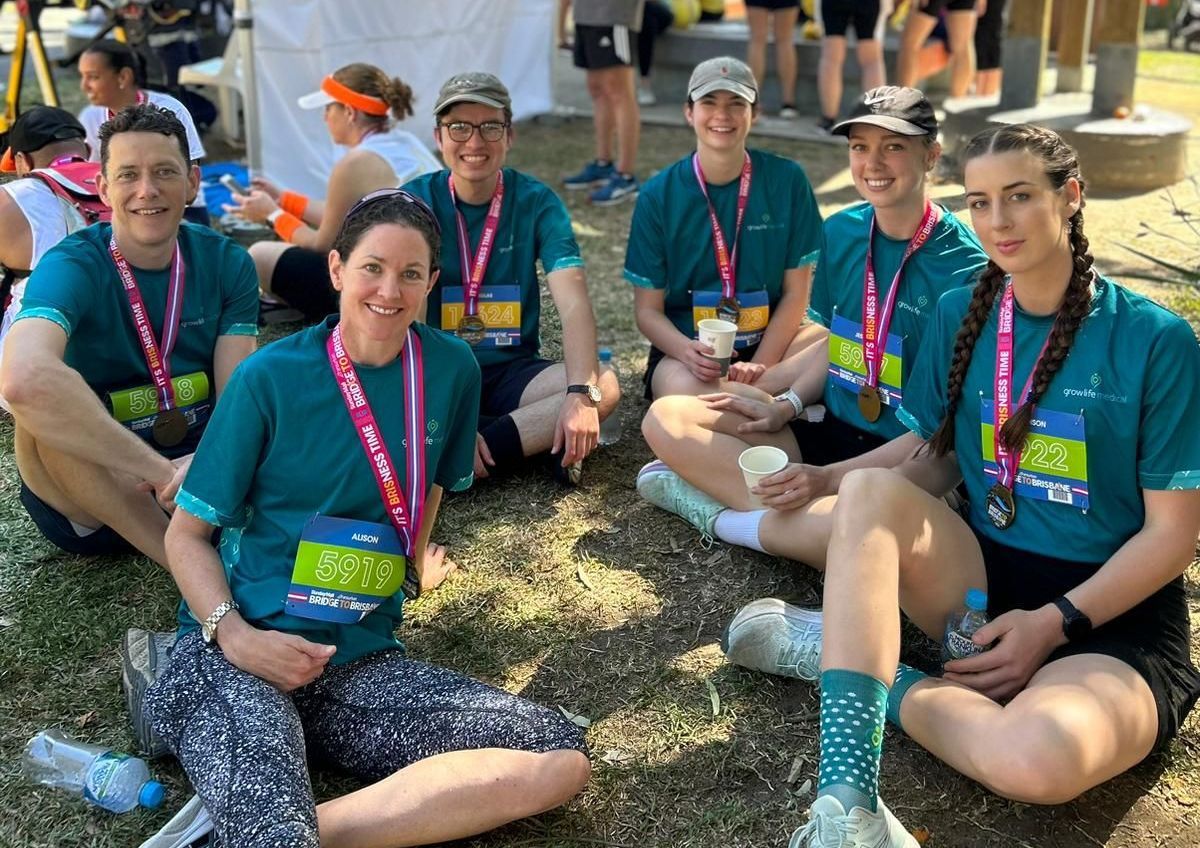Sports Nutrition for Runners: Part 2
Our Growlife Bridge to Brisbane team came out guns blazing recently thanks to part 1 of this blog series. However, I think I speak on behalf of everyone when I say the hours and days following the race were... well to sum it up in one word... sore! This made us all acutely aware of the importance of RECOVERY! In part two of this blog series, we will explore how to feed for recovery.
When it comes to post- exercise nutrition, many people think of protein shakes. While this can be part of an athlete’s recovery nutrition strategy, it is not the be all and end all.

Key components of recovery nutrition include:
- Rehydrating
- Re-fuelling
- Repairing muscles
- Rest
That’s right! The 4 R’s!
Rehydration:
Replacing lost fluids during exercise is often considered the first priority of recovery nutrition, and should be actioned ASAP after exercise. Most athletes will experience fluid losses through sweat during their session, and adequate hydration is required for normal body functions. Relying on thirst, to determine how much fluid needs to be consumed following exercise may result in inadequate rehydration as our thirst signals are typically decreased during this time.
The amount of fluid a person needs to have after exercise depends on multiple factors such as exercise duration and intensity, environmental conditions, and muscle mass. Therefore, working with a sports dietitian to develop a unique rehydration strategy can be useful. Some tips to get you started include:
- Start to rehydrate as soon as exercise is completed
- Aim to replace 100-150% of the losses incurred during exercise (you can figure this out by weighing yourself directly before and after your exercise session)*
- Drinks such as oral rehydration solution (eg Gastrolyte, hydralyte), milk and juice are more effective at rehydrating than water or sports drinks (Gatorade, powerade) - this is because some of the different nutrients in these drinks effect how our body handles them. For example, the electrolytes in oral rehydration solution help our body retain fluid, while the nutrients in drinks such as milk and juice are absorbed more slowly
- Eating something salty along with your drinks helps the body to absorb more fluid
*If you have a history of an eating disorder, disordered eating or find knowing your weight triggering, ask a trusted person to help you with this.
Re-fuelling:
As discussed in part one of this series, the body stores carbohydrates in both the liver and muscles. Exercise depletes our body’s carbohydrate stores, and therefore needs to be replenished afterwards. It takes 24 hours for the body to fully replace its stores of carbohydrates.
It is difficult to provide specific advice regarding the amount of carbohydrate which should be following exercise as this is dependent upon multiple individual factors including:
- Whether the exercise session is likely to have depleted the athlete's carb stores.
- Muscle mass
- Time to next race or training session
A helpful starting point can be to include a carbohydrate rich snack post training + aim to make 1/3 of the meal after your session carbohydrate based.

Repair:
Protein plays an essential role in supporting the repair and growth of muscles following exercise. There are several factors to consider with regards to protein intake:
- Choosing good sources of protein – these include:
- Meat, chicken, fish, eggs
- Dairy (milk, yoghurt, custard and cheese)
- Spreading protein across the day. A good guide is to choose a protein rich food at each meal.
While protein supplements are not required, they can be useful.
If you decide to take a supplement, ensure that you choose one which is batch tested. Looked for the Informed sport or HASTA certification. This decreases the risk of your supplements being contaminated with substances which are banned and/or could have a negative impact on your health.

Image source:
https://hasta.org.au/supplement-testing/

Rest:
Sleep is well understood to serve an important function for overall health and wellbeing, it is also understood to impact upon performance and recovery. However, getting a good night's sleep can be easier said than done.
Did you know nutrition can play an important role in supporting good quality sleep?
| Strategies that enhance sleep | Factors which negatively impact sleep |
|---|---|
| Eating enough carbohydrates and protein overall – some research has shown that diets rich in carbohydrates and high in protein support sleep | Being over-hydrated (waking up to go to the toilet) |
| Tryptophan rich foods such as egg, milk, turkey and salmon | Being hungry/not eating enough throughout the day |
| Melatonin rich foods such as tart cherries, milk and walnuts |

A number of factors can make it challenging to meet your nutrition needs following exercise, particularly on competition days or long sessions, such as suppressed appetite, fatigue and a lack of availability of foods and fluids. Therefore, planning ahead is vital!
A word on alcohol:
While a post-competition beer can feel like an obligatory part of the Australian sporting culture, it is important to consider how it can negatively impact on your body's recovery process. These consequences include:
- Decreased ability to refuel (produce glycogen) - this is likely due to reduced consumption of carbohydrate when drinking alcohol.
- Decreased muscle repair + growth – importantly this appears to occur even when athletes consume protein.
- Reduced cognitive function the following day which can increase injury risk
- Decreased sleep quality
- Impair repair of soft tissue injuries.
- There are also performance impacts such as reduced upper body power, decreased aerobic performance
Tips:
- Take a post-race snack with you so that you don’t have to go looking for one when you are tired after your run
- Have access to water or electrolyte drinks after your race
- Keep an eye on the colour of your urine to assess rehydration
- Don’t go overboard with the alcohol
As you can see nutrition plays an important role in supporting your body to recover and adapt to exercise. Recovery nutrition entails rehydration, refueling, repair of muscle tissue and rest. Within this article we have scratched the surface on nutrition strategies to support recovery, for more information or for help understanding how to apply these strategies to your circumstances book an appointment here with our Sports Dietitians.
More Articles on Health & Wellness






